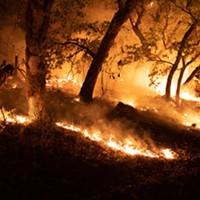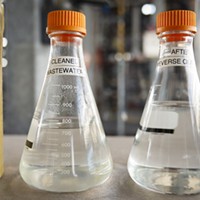'A Miracle Didn't Happen'
Abalone season could be shuttered for another two years
By Kimberly Wear [email protected] @kimberly_wear[
{
"name": "Top Stories Video Pair",
"insertPoint": "7",
"component": "17087298",
"parentWrapperClass": "fdn-ads-inline-content-block",
"requiredCountToDisplay": "1"
}
]
When the California Fish and Game Commission took the unprecedented step last year of shutting down the North Coast's 2018 red abalone season, the idea was to give the last vestige of the state's once great fishery some time to bounce back.
The decision came in the aftermath of what scientists call a "perfect storm" of ecological events that reverberated across the region, leaving formerly lush kelp forests — the primary source of food for the prized mollusk — reduced to virtual underwater wastelands overrun by marauding bands of scavenging purple urchins.
Unfortunately, for the most part, not much has changed.
"The sad news is a miracle didn't happen," Sonke Mastrup, a marine environmental manager with the Department of Fish and Wildlife, told commissioners at their last meeting in October. "That stock has collapsed. It's going to take a long time to recover."
Now, with the precipitous drop in the abalone population continuing its steep decline, the commissioners are poised Dec. 12 to extend the closure for another two years with a new proposed sunset date in April of 2021.
Complicating matters is what Mastrup referred to as the "math of the abalone," basically that the shellfish are slow growing and he estimates it will take a decade to bring a new stock up to legal size.
Meanwhile, the abalone left behind are continuing to starve after reefs that once teemed with a variety of marine life from Sonoma County to Southern Humboldt were scoured bare by the spiky hordes, becoming what is known as urchin barren — in some cases devoid of even the calcified pink algae that normally blankets the rocks.
The series of events that led to the ecosystem's unraveling happened in relatively short order, with the first signs coming back in August of 2011 with an outbreak of toxic algae off the Sonoma County coast. That was followed two years later by the decimation of the region's sea stars at the hands of a mysterious wasting disease.
No longer held in check by one of its main predators, the purple urchin population surged in numbers amid an unprecedented warming of the North Coast's normally cool waters with the appearance of what's been called "the blob" — basically an oceanic heat wave that was soon succeeded by the "Godzilla" El Niño of 2015.
These rapidly changing conditions ravaged the coast's bull kelp forests and, in turn, left the abalone with nowhere to turn for food, leading first to a decline in the shellfish's reproduction and, eventually, starvation.
By the summer of 2017, surveys at 10 sites in Mendocino and Sonoma counties showed abalone populations had declined by an average of 58 percent. One year later, the numbers were increasingly dire.
"When we saw the die-offs occurring, we were optimistic that it was a one-year event. That conditions were going to improve, the populations were going to rebound," Fish and Wildlife's Marine Region Manager Craig Shuman told the commission during the initial hearing on a possible extension of the closure this August. "We have unfortunately not seen that. "
According to surveys that had taken place that week, Shuman reported that mortality rates were continuing to increase at a site off Fort Ross in Sonoma County, which had been closed to the public since 2015 — going from 23 percent in 2017 to 71 percent this year.
Things were a bit more mixed at Van Damme site in Mendocino County, where the density of abalone slightly improved but the mortality rate also increased to 53 percent, up from 36 percent the year before.
Reef Check, an ocean monitoring organization that has employed teams of volunteer divers to help monitor a series of sites off the North Coast since 2007, found similar statistics, according to Tristin McHugh, North Coast regional manager of the group's California Program.
In Mendocino County, where prior to a major loss of kelp there were an average of 47 abalone in each 60-square-meter site surveyed in 2014, less than 14 were observed this year — or half the 2017 count.
For now, McHugh said, "the story remains the same."
But that's not to say that there aren't some bright spots — including off Trinidad, where McHugh and a team dived two months ago after hearing reports of urchin barren sightings.
Instead she found the conditions were stable with "relatively the same abundance" of abalone and kelp as the previous year.
"We are not necessarily seeing the rapid, dark, distinctive decline like we've seen in Mendocino or Sonoma county," McHugh said, adding that Reef Check is "keeping eye on Humboldt."
Trinidad is one of several "beautiful oases where we have areas that urchins have yet to penetrate," she said, adding that scientists are working to identify those sites on the North Coast to try to "find out why they're there and why they remain successful in having kelp."
Among the emerging theories is the possibility that Shelter Cove, which has experienced the urchin barren phenomena, represents a "biogeographic break," a sort of invisible ecological boundary that determines which species thrive in an environment — much like Point Conception down south.
The silver lining in all of this, McHugh said, may be the way scientists and citizens are coming together to find solutions — including urchin population control measures — as discussions progress on how to move forward under what could prove to be the North Coast's new normal.
"It's not one person's battle, it's all of ours and it's going to take all of our voices to find something that jives with our community," she said.
Kimberly Wear is the assistant editor at the Journal. Reach her at 442-1400, extension 323, or [email protected]. Follow her on Twitter @Kimberly_wear.
Speaking of...
more from the author
-
Our Last Best Chance
- Apr 11, 2024
-
Dust to Dust
The green burial movement looks to set down roots in Humboldt County
- Apr 11, 2024
-
Judge Rules Arcata Can't Put Earth Flag on Top
- Apr 5, 2024
- More »
Latest in News
Readers also liked…
-
Through Mark Larson's Lens
A local photographer's favorite images of 2022 in Humboldt
- Jan 5, 2023
-
'To Celebrate Our Sovereignty'
Yurok Tribe to host gathering honoring 'ultimate river warrior' on the anniversary of the U.S. Supreme Court ruling that changed everything
- Jun 8, 2023



































